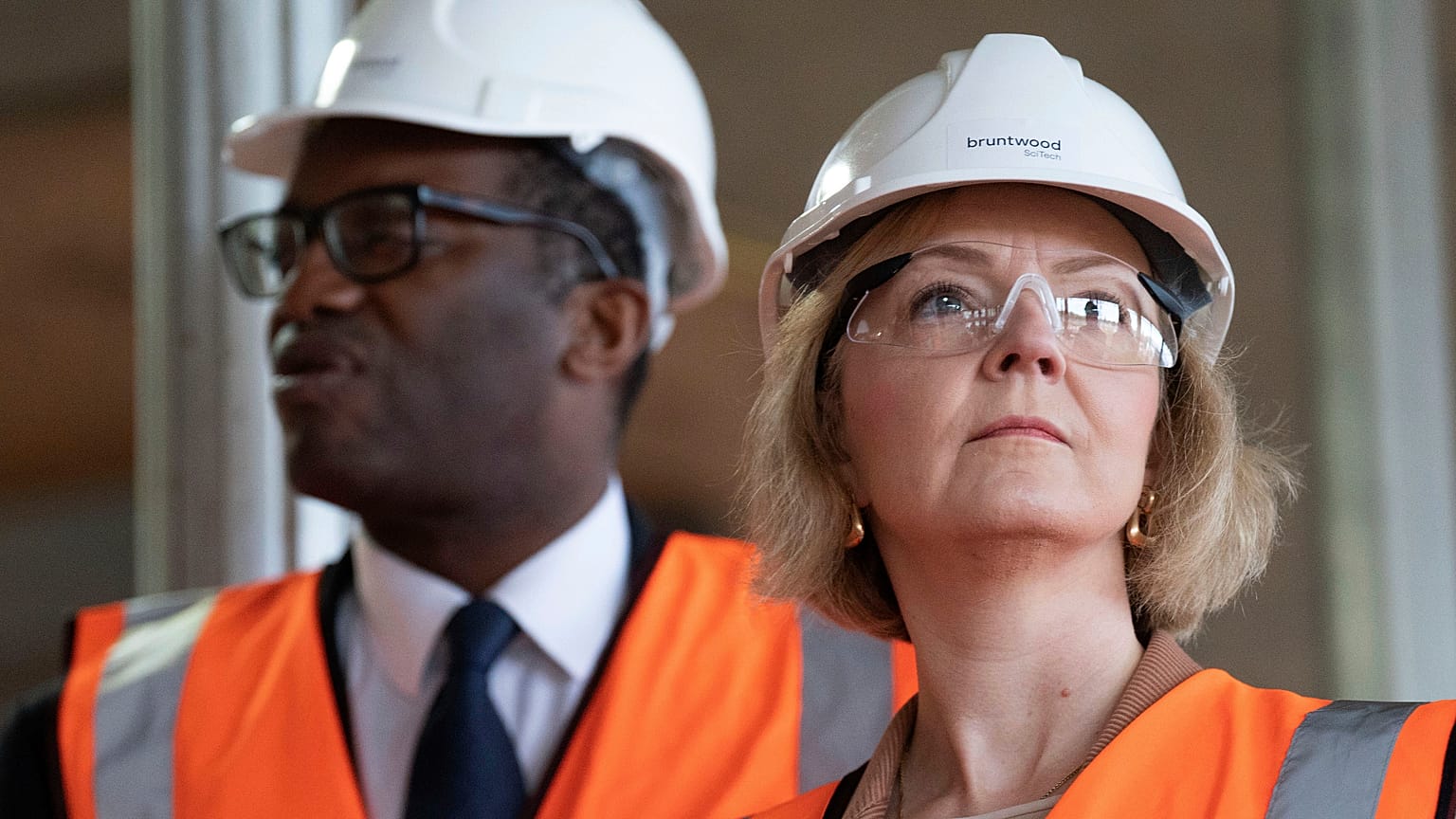From Boris Johnson's summer resignation, to the economic and political turmoil under Liz Truss's tenure that ended with her departure too: a blow-by-blow account of events in the UK's latest crisis.
Liz Truss became Britain's shortest-serving prime minister when she resigned on October 20 after a mere 45 days in office.
 ADVERTISEMENT
ADVERTISEMENT
 ADVERTISEMENT
ADVERTISEMENT
Her fiscal plan prompted economic and political turmoil. The humiliating U-turns that followed saw her finance minister replaced, virtually her entire programme reversed, and sent her government into meltdown.
Here are the key events in an extraordinary three months of political melodrama.
Thursday 7 July: Prime Minister Boris Johnson announces his resignation after one scandal too many prompts droves of top government officials to quit. He steps down immediately as Tory party leader but will stay on in Downing Street until a successor is chosen.
Sunday 10 July: Foreign Secretary Liz Truss enters the party leadership contest, joining a crowded field of 11 candidates in the race to succeed Johnson. Launching her campaign with an article in the Telegraph, she pledges to cut taxes "from day one" if she wins.
Wednesday 13 July: By the second round of voting among Conservative MPs, Truss is in third place with 64 votes in a field that has been narrowed to six candidates. The frontrunner, Britain's finance minister Rishi Sunak, has 101 votes.
Wednesday 20 July: The day after another round sees Truss close the gap, the final vote among MPs sees the foreign secretary narrowly overtake rival Penny Mordaunt to face a run-off for the leadership with Sunak. The outcome will be decided by Conservative Party members after a summer campaign. Whereas Sunak has topped each poll among lawmakers, Truss is more popular with the party’s grassroots and is a favourite of its right wing.
Monday 25 July: Sparks fly in a TV debate between the two rivals. Truss promises again to cut taxes as soon as she takes office, using borrowing to pay for it. Sunak says he would get inflation under control first, arguing that Truss’s plan would increase the public debt and leave people worse off in the long run. Tempers flare as Sunak says "it’s not moral" to pass the bills on to future generations. Truss dismisses that as "Project Fear".
Monday 1 August: Truss describes Scotland's First Minister Nicola Sturgeon as an "attention seeker" at a hustings event, provoking a row with Scottish nationalists.
Monday 15 August: Both candidates' economic plans are attacked as "pure fantasy" by Paul Johnson of the Institute for Fiscal Studies (IFS). "Apparently, we can have our cake and eat it," he writes. "They seem to think they can promise tax cuts without any hint that this might matter for the quality of public services or the level of borrowing and debt."
Wednesday 17 August: Truss continues to resist direct aid for households to cope with soaring energy costs. "What won't work is simply a sticking plaster of handing more money out without dealing with the root cause," she says in an interview.
Thursday 25 August: "The jury's out," Truss says when asked at another campaign event whether French President Emmanuel Macron is "friend or foe".
Friday 26 August: She now appears to soften her stance on handouts as it's revealed that consumers face an 80% hike in energy costs come October. "I will take decisive action on entering No 10 to provide immediate support," she writes in the Daily Mail.
Monday 5 September: The Conservative leadership result confirms victory for Truss, who wins 81,326 votes among party members, ahead of Rishi Sunak's 60,399.
Tuesday 6 September: Boris Johnson tenders his resignation to the Queen at Balmoral, her Scottish residence. Shortly afterwards the monarch receives Liz Truss who is confirmed as prime minister, the UK's fourth in six years. In her first address in Downing Street, she says her first priority is to "get Britain working again" with a "bold plan to grow the economy through tax cuts".
Wednesday 7 September: Liz Truss announces her new cabinet, notable for a strong presence of loyalists who had backed her for the premiership. At her first session of Prime Minister's Questions, she promises immediate help for households and businesses over energy costs, but she rules out a windfall tax on energy firms.
Thursday 8 September: A cap on domestic energy prices is confirmed. The cost is not stated but estimates put it at over €115 billion. The Treasury confirms that the ministry's most senior civil servant, Tom Scholar, has been sacked, despite warnings that his experience would be needed.
Thursday 8 September: Queen Elizabeth II dies aged 96, prompting an 11-day period of national mourning until her funeral, during which daily politics is put aside.
Friday 23 September: Finance minister Kwasi Kwarteng presents his Growth Plan — dubbed a "mini-budget" — to parliament. On top of the massive energy support plan, it involves sweeping tax cuts the chancellor says will boost economic growth and generate increased revenue without involving spending cuts. There are few details on the costs or the impact on the government’s own targets for reducing deficits and borrowing. Over the weekend Kwarteng hints at more tax cuts to come.
Monday 26 September: The pound falls to an all-time low against the US dollar. The cost of borrowing for the UK rises sharply amid turmoil on financial markets. The Bank of England is forced to intervene to prop up the bond market and stop a wider economic crisis. A top US central bank official warns the UK's fiscal plan could negatively impact the wider European and global economy.
Tuesday 27 September: Opposition Labour leader Sir Keir Starmer accuses the government of having "lost control of the British economy".
Thursday 29 September: Truss defends the government's tax-cutting plan, saying it is needed "to improve growth levels in the economy".
Saturday 1 October: On the eve of the Conservative Party conference, Truss appeals to voters, accepting that her plan "involves difficult decisions and does involve disruption in the short term" in an article for The Sun. She insists she is doing what she believes is "right for the country", promising that the government "will keep an iron grip on the national finances".
Sunday 2 October: Truss admits she should have done more to "lay the ground" for her economic plan, but stands by her package. Opinion polls show Labour with a commanding lead as internal dissent grows within Tory ranks.
Monday 3 October: Kwarteng announces a U-turn on plans to cut the 45p rate of tax on earnings above €172,000 a year, which had been dubbed a tax cut for the rich.
Tuesday 4 October: Truss faces a fresh political rebellion after refusing to rule out cutting benefits to the UK's poorest people, in an interview with the BBC. In her speech to the party conference, she says "I get it, and I have listened" over the top tax rate, but stands by her overall plan and blasts opponents as the "anti-growth coalition".
Thursday 6 October: There's some respite from domestic woes as Truss attends the first meeting of the European Political Community in Prague, where leaders present a united front against Russia's war in Ukraine—and the prime minister now calls France's President Macron "a friend".
Monday 10 October: Kwarteng says he will release the government’s detailed fiscal plans on 31 October, three weeks earlier than scheduled. The government's failure to detail how it will pay for its tax cuts has been blamed for the rollercoaster ride on the markets.
Tuesday 11 October: The government says renewable power companies in England and Wales will face what's described as a windfall tax from early next year, in another apparent U-turn.
Wednesday 12 October: The Bank of England confirms it will stop supporting the bond market on Friday. The news has caused the pound to fall further. Official figures show the UK economy shrank unexpectedly in August, reinforcing fears of an impending recession. As pressure grows on the government to explain how it intends to plug the hole in the public finances, Truss raises more eyebrows when she rules out cuts in public spending.
Thursday 13 October: World financial leaders criticise the UK's plans at a meeting in Washington, attended by Kwarteng and Bank of England Governor Andrew Bailey. Questioned on his position, the finance minister says he is "not going anywhere". Later he leaves unexpectedly early to return to London, where the prime minister has been holding talks with unhappy government MPs.
Friday 14 October: Confirmation that Truss has sacked Kwarteng follows his arrival back in London. He will be replaced by former health and foreign secretary Jeremy Hunt. Truss appears before reporters to announce a U-turn on a plan to scrap a rise in corporation tax. She says she is "incredibly sorry" to see Kwarteng go but acted in the national interest to ensure stability.
Monday 17 October: The new Chancellor of the Exchequer announces a complete reversal of Liz Truss' controversial "mini-budget" that caused such turmoil, having warned at the weekend that "difficult decisions" lie ahead involving potential tax rises and spending cuts. In a BBC interview that evening Truss recognises "mistakes" and says "sorry".
Wednesday 19 October: Liz Truss insists she is "a fighter not a quitter" in her first Prime Minister's Questions in parliament since her budget plan collapsed. But by that evening her government is in meltdown after the interior minister Suella Braverman resigns — firing a broadside at Truss — and party discipline breaks down amid chaotic scenes over a parliamentary vote.
Thursday 20 October: After a hastily arranged meeting with senior Conservative officials, Truss announces her resignation outside 10 Downing Street after 45 days in office, to become the shortest-serving prime minister in UK history. The same afternoon, a contest is announced to find a new leader.
This article originally published on 14 October has been updated following Liz Truss's resignation.














